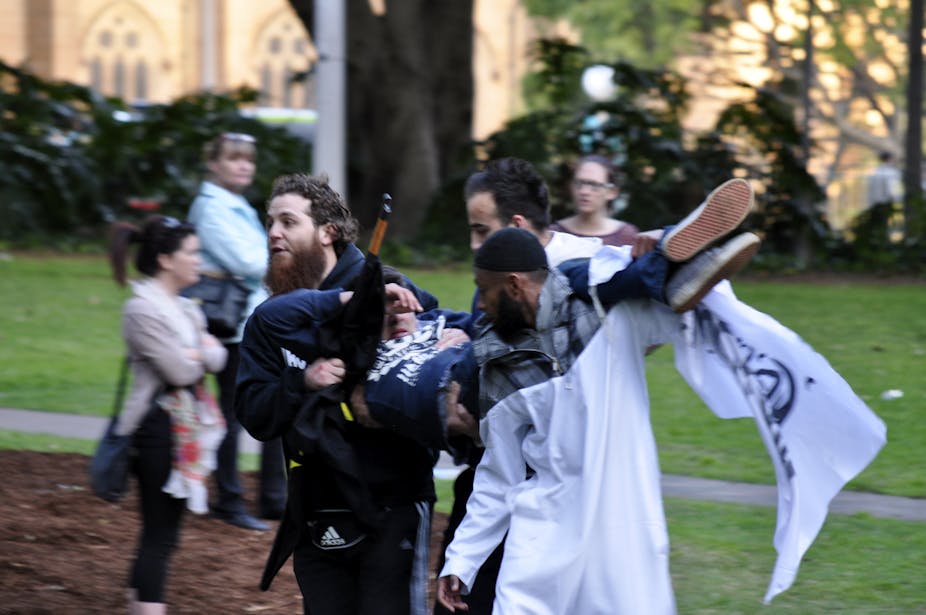News of the movie “Innocence of Muslims” and the dissemination of its clips on YouTube have inflamed emotions across the Muslim world. It triggered a spate of violent demonstrations, including an attack on the US consulate in Benghazi that led to the death of the US ambassador to Libya.
The burning of the US embassy in Tunisia, strikes by lawyers in Pakistan, and a violent demonstration in Sydney all reflect both the intensity of emotion, and destructive responses that harm Muslims more than anyone else.
The deep emotional anguish felt by even the most educated and usually rational Muslims is closely linked to the special place assigned to Prophet Mohammad. In our belief system, the Prophet is the messenger through whom God communicated the message contained in Qur’an. His life, actions and views provide understanding of God’s message. He occupies a sacred space in the hearts of Muslims around the world. Any disrespect is felt as an intrusion into this sacred space.
It was the presumed intention of such disrespect that triggered the killing of the Pakistan Governor of Punjab, Salman Taseer, by his personal bodyguard. There have been many similar violent outbursts in Muslim history. These violent and destructive responses only serve to strengthen beliefs of Muslim irrationality among secularists and free speech advocates.
However, Muslims are not alone in having sacred spaces in their hearts. We in the West have a special respect that keeps images of the deceased away from our TV screens and news media. Gradually, in Australia, we have come to respect the wishes of Aboriginal people not to see images of deceased ancestors.
Opposition to violence in all its forms is fortunately gaining momentum in societies around the world. The UN Convention on the Rights of the Child, opposition to gender-based violence and bullying in all its forms are some examples.
I would argue that intentionally violating spaces sacred to Muslims or any other people falls within the space of violence. Though not obviously targeting anyone living today, deliberately inflaming emotions needs to be acknowledged as violence.

But how are Muslims to respond? Violence only delays the resolution of disputes that linger over generations. I wonder if any of the demonstrations, let alone violence, alleviated the hurt felt by Muslims. If anything, I would suggest that these responses have merely reinforced the view of Muslim irrationality.
In a global village dominated by, and shaped by the continuous flow of information and ideas, such actions can only inflame divisions between the Muslim and the non-Muslim world.
It is time that Muslims revisit the process of reacting to such intense violations of their sacred space by opting for responses that secure a positive result. Muslims need to develop more measured and effective responses to such intense violations of our sacred space. Instead of senseless violence hurting Muslims more than any people they might imagine they are targeting, Muslims need to consider responses like legal action that target those who produced the movie with the clear intention of targeting Muslim feelings.
Carefully coordinated financial and trade sanctions by Muslim majority states against those who financed the movie could be equally effective. There are already voices within the US criticising the production, and distancing themselves from those who participated in the process, including Terry Jones, the pastor who advocated burning the Qur’an in 2010.
Responses like these could help the Muslims deal with such attacks on religious feelings. A billion dollar lawsuit against those who target religious beliefs, and engage in intentionally intense violation of sacred spaces, would shift the whole discussion to a different plane. Even if the courts throw out the suit, it would focus attention on legal pathways to oppose such violence aimed at space that is sacred for a quarter of humanity. It may even create the space in which faith-based communities cooperate in developing ideas and legal pathways that counter violence of this kind.
Muslims living in the West have a special responsibility in this process. As occupants of space with majority non-Muslim populations, we need to engage in a process of educating our fellow citizens on the reasons for our discomfort and hurt when our religious feelings and sacred spaces are intentionally invaded. But at the same time, we also have a responsibility to ensure that we educate our younger generations to abide by the laws governing our respective countries.
Inciting violence, and communicating ideas that condone physically violent responses to actual or perceived blasphemous actions merely contribute to engendering divisions in the societies we live in.
Placards with demands to “behead all those who insult the Prophet” fall in this category. They undermine communal harmony and reinforce negative images of Muslims. They also encourage some in these communities to further consider hurting Muslim feelings.
So if we are to turn the tide against violence against Muslim belief systems, we have to use the route of rationality, education and negotiation.

